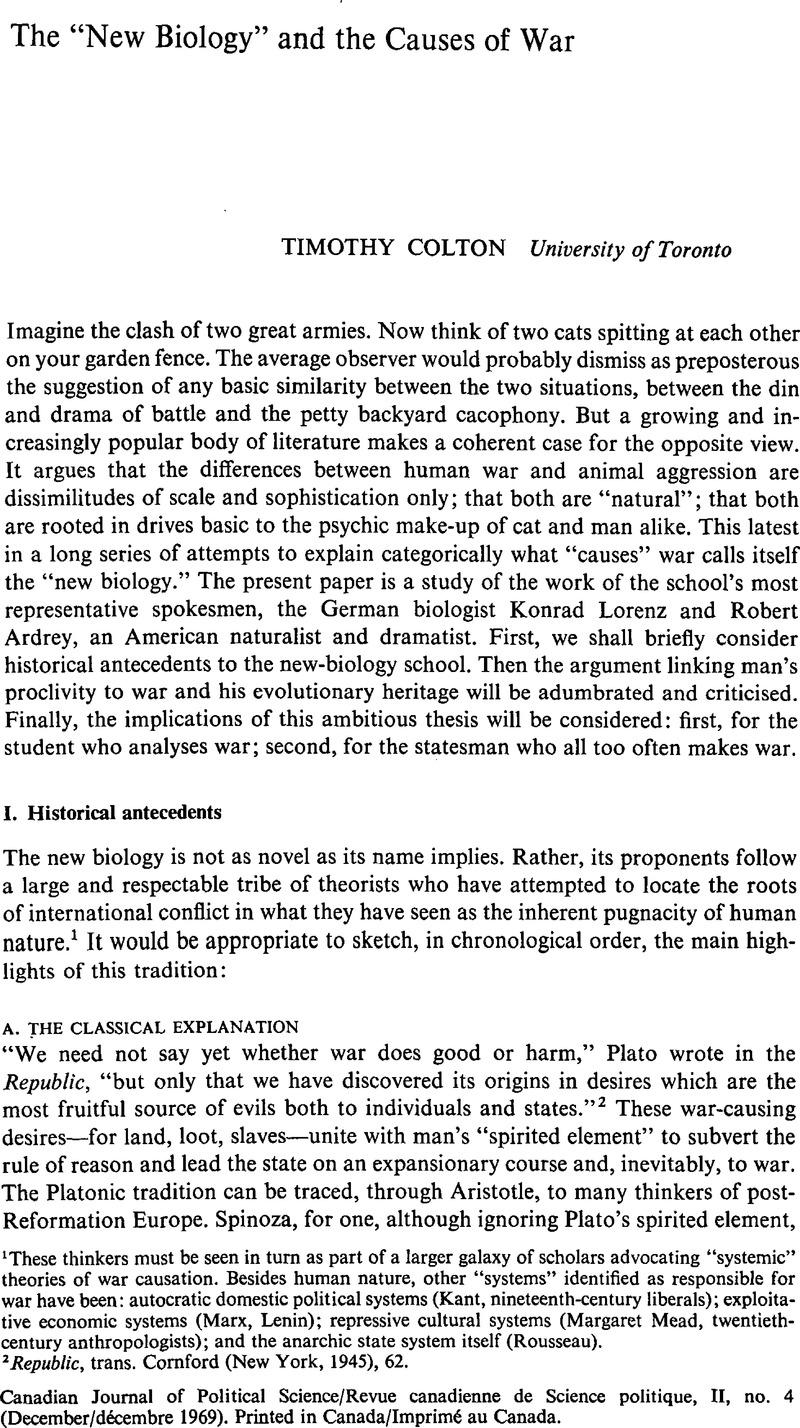No CrossRef data available.
Published online by Cambridge University Press: 10 November 2009

1 These thinkers must be seen in turn as part of a larger galaxy of scholars advocating “systemic” theories of war causation. Besides human nature, other “systems” identified as responsible for war have been: autocratic domestic political systems (Kant, nineteenth-century liberals); exploitative economic systems (Marx, Lenin); repressive cultural systems (Margaret Mead, twentieth-century anthropologists); and the anarchic state system itself (Rousseau).
2 Republic, trans. Cornford (New York, 1945), 62.
3 Civilization and Its Discontents, trans. Riviere, Joan (London, 1963), 59.Google Scholar
4 Ibid., 48.
5 Ibid., 59.
6 For a typical statement of this, see Durbin, E. F. M. and Bowlby, John, “Personal Aggressiveness And War,” in War: Studies from Psychology, Sociology, Anthropology, ed. Bramson, Leon and Goethals, George W. (New York, 1964).Google Scholar
7 See his essay “The Instinct of Pugnacity,” in Ibid.
8 For example, this interpretation of Adolf Hitler by a friend: “The abounding nervous energy which found no normal release sought compensation first in the subjection of his entourage, then of his country, then of Europe…. In the sexual no-man's land in which he lived, he only once nearly found the woman, and never even the man, who might have brought him relief.” Quoted in Bullock, Alan, Hitler: A Study in Tyranny (Harmondsworth, England, 1962), 392.Google Scholar
9 Durbin and Bowlby, “Personal Aggressiveness and War,” 100.
10 The Territorial Imperative (New York, 1966), 5.
11 On Aggression (London. 1966), 31.
12 “War and Aggressiveness: A Survey of Social Attitude Studies,” in Man and International Relations: Contributions of the Social Sciences to the Study of Conflict and Integration, ed. Zawodny, J. K. (San Francisco, 1966), I, 578.Google Scholar
13 Wright, Quincy, A Study of War, abridged by Wright, L. L. (Chicago, 1964), 53.Google Scholar
14 Hitler: A Study in Tyranny, 465.
15 Shirer, William, The Rise and Fall of the Third Reich (Greenwich, Conn., 1960), 814.Google Scholar
16 “The Moral Equivalent of War,” in Bramson and Goethals, eds., War, 23. Nor is the observation novel with James. Jean Bodin wrote that: “The best way of preserving a state, and guaranteeing it against sedition, rebellion and civil war, is to keep the subjects in amity with one another, and to this end, to find an enemy against whom they can make common cause.” Quoted in Waltz, Kenneth, Man, the State and War: A Theoretical Analysis (New York, 1959), 82.Google Scholar Freud, McDougall, William Graham Sumner (who coined the in-group-out-group terminology), and many others have made the same point.
17 Ardrey, The Territorial Imperative, 269.
18 Wright, A Study of War, 50.
19 Ibid., 81.
20 Wight, Martin, “War and International Politics,” Listener LIV, 1389 (Oct. 13, 1955), 585.Google Scholar
21 Wright, A Study of War, 53.
22 The Territorial Imperative, 236.
23 Ibid., 232, 28, 319.
24 Ibid., 265.
25 Ibid., 305.
26 Ibid., 244.
27 Ibid., 337, 338.
28 On Aggression, 243.
29 “The Moral Equivalent of War,” 26, 29.
30 International Politics in the Atomic Age (New York, 1963), 40.
31 Ibid., 41.
32 Nobody Wanted War: Misperception in Vietnam and Other Wars (Garden City, NY, 1968), 41.
33 On Aggression, 233.
34 White, Nobody Wanted War, 162.
35 With his narrow approach, Ardrey says quite explicitly that the US intervention in Vietnam has been “unmotivated by territorial defence.” The Territorial Imperative, 318.
36 Ibid., chap. 7.
37 Man, the State and War, 33.
38 Or Lorenz's, for that matter. He talks much about his belief in man's free will, then writes: “By itself, reason can only devise means to achieve otherwise determined ends; it cannot set up goals nor give us orders…. The motive power… stems from instinctive behaviour forms much older than reason and not directly accessible to rational self-observation.” On Aggression, 213.
39 Ibid., 197.